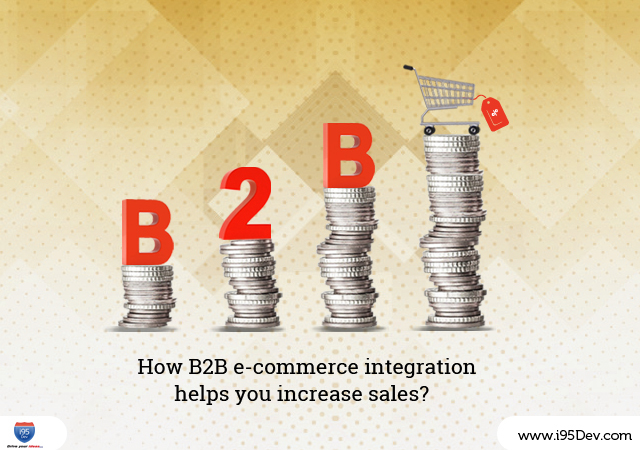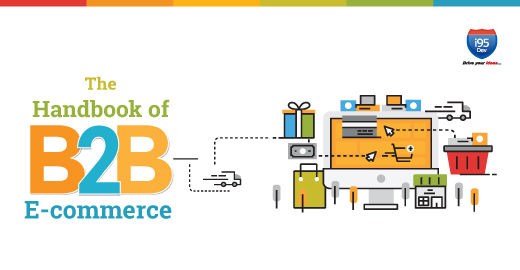How B2B eCommerce integration
helps you increase sales?

B2B domain is evolving at a rapid pace courtesy eCommerce. Sample some of these trends which show the only way for B2B eCommerce is north.
- 93% of businesses prefer buying online when they make up their mind on what to buy. One of the main reason is ease of buying process, which is relatively complex in a traditional B2B channel.
- 74% of the B2B research in done online, which is becoming on par with their B2C domain. This suggests online medium is increasing its worth for B2B businesses too.
- 72% of B2B customers prefer self-service and a quick access to accounts and orders. Thanks to B2C buying and behavior the lines are getting blurred the way people shop even in B2B scenario.
- This point takes the crown of all, 96% of B2B businesses believe ERP eCommerce integration to be critical to their businesses. The core of this article only justifies this belief.
This belief of 96% B2B businesses only reinforces the point which we at i95Dev have been advocating since a decade of our inception. B2B eCommerce integration is critical for all businesses irrespective of industry. A B2B eCommerce integration not only provides your business a streamlined operational efficiency but make your business stand among the crowd.
It helps your B2B business operation to implement simple yet effective ways to sell on your eCommerce platform.
What are the prime elements you should be looking for in eCommerce?
Before going into the intricacies and the utility of B2B eCommerce integration there is an element which should be taken into account. The effectiveness of the eCommerce platform you choose is very crucial to the ERP eCommerce integration you implement.
Magento 2 has been leading the pack with it’s out of the box functionalities. B2B eCommerce titans like ‘Grainger’ have been constantly posting impressive figures due to Magento 2 B2B potential.
Read more about the features that you should be looking for in a B2B eCommerce platform and How Magento 2 fulfills them in this blog.
Why do the majority of B2B businesses vouch for B2B ecommerce integration?
The reasons cited by 96% of B2B eCommerce businesses for vouching for ERP eCommerce integration are:
- All round inventory visibility which is crucial to reduce over or underselling of their inventory
- Achieving increased order accuracy
- A decrease in the time to process orders
- The ability to deliver on time and achieve scheduled order delivery a la B2C eCommerce
Now if you read between the lines of the reasons cited for B2B businesses opting ERP eCommerce integration you decipher a message. All the above factors help in formulating strategies to increase B2B eCommerce sales. Meaning ERP ecommerce integration definitely plays a role in a strategic approach to increase B2B eCommerce sales.
Read our new eBook we wrote along with Magento, on key Magento B2B features.
Some of the crucial strategies unanimously agreed upon by established B2B eCommerce businesses are.
- Effective Client support
Delays in providing timely customer support chips away your clients, it is imperative. A study by Harvard Business Review states that the average response time for companies is pegged at 42 hours. It is safe to perceive a response time of 42 hours in the age of Amazon as slow.An ERP eCommerce integration can really help you in this aspect. As and when a query related to a change in order or some discrepancy is placed by a customer, a CRM eCommerce integration does the job.
The queries are immediately synced back to the CRM against the customer id. This gives your customer representative a real-time view of the customer’s issue. The B2B eCommerce integration even helps the sales representative get an overall view of the client’s previous order history, order status and payments which can help them to establish a pattern to formulate an effective solution to the client’s query.
This level of precision from your customer representative team will give your B2B business a loyal customer. A B2B ecommerce integration effectively reduces the time taken by your customer representatives to respond to the client’s queries taking your B2B business a few notches higher.
- Providing personalized pricing
Pricing in B2C environment is easy compared to B2B eCommerce given the complexity of their pricing function. The reason for this complexity is the way orders are placed on a regular basis for large quantities by the customers, discounts and varied prices for different types of customers is what makes pricing in B2B complex.A B2B eCommerce integration eases the scope of dynamic pricing system, which is how a B2B eCommerce business functions. Some of the typical B2B eCommerce scenario functions are
- Creating multiple pricing lists for volumes, fixed pricing, and discounted products
- Applying these lists to prospect and existing clients and customer groups
- Applying minimum and maximum limits for the number of products ordered
- Checking the invoices of the deals before approving
- Providing further loyalty and reward points to customers if applicable
- Effective omnichannel management
What is a typical B2C scenario? A shopper does his research from her mobile, web rooming on a physical store to compare prices, checks it again on her way during the commute and finally places an order from her laptop.This same procedure is even applied to B2B e-commerce, customers bounce from device to device for research, consideration and finally order placement. A B2B e-commerce integration helps in this aspect greatly and presents a perfect omnichannel strategy in place for you.
The inventory levels, product details, prices and various other critical factors required to make a decision are populated from the ERP and PIM system and projected onto the eCommerce platform. A B2B eCommerce integration allows your eCommerce platform to act a single point hub for managing inventory, product and sales from a single point irrespective of the channel.
- Increased scope of self-service
Another main reason for the 96% of B2B businesses to vouch for B2B eCommerce integration is the ability to provide self-service. The ease with which the customer can track, modify their orders and payments is what made B2C stand out from B2B.But with the B2C features being replicated here customers expect the same even in a B2B scenario. With a B2B e-commerce integration, the prospect of your customers tracking their orders, modifying the quantity of inventory placed and even method of payments dynamically becomes easy.
This drastically reduces the burden on your resources who would not have to update each and every modification and in turn, even reduces the scope for errors. We see a real positive Domino effect due to the B2B eCommerce integration in place.
With these points taken care of, it is no wonder the majority of B2B eCommerce merchants are aligned with i95Dev’s thought process. Now it is up to you to decide if you want to be in the 96% or on the other side of the court.
Conclusion
i95Dev worked with various companies spanning different continents since 2000. We are Magento platinum certified eCommerce solutions providers. Our clientele span across various domains both B2B and B2C. Apart from Magento development, we even provide integration solutions between your Magento store and the most widely used ERP systems (Dynamics AX, GP, NAV, SAGE, SAPB1). If you are an eCommerce operation looking to take the next logical step contact us at info@i95dev.com.





